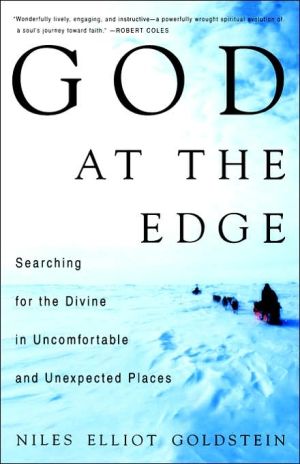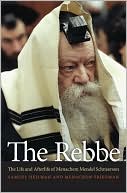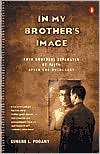God at the Edge: Searching for the Divine in Uncomfortable and Unexpected Places
Here is a book about adventure, raw experience, and facing inner demons. Niles Elliot Goldstein is a young rabbi who sets out to find God in tough and often scary situations: dogsledding above the Arctic Circle, taking the Silk Road into Central Asia without a visa, being chased by a grizzly bear, cruising with DEA agents through the South Bronx, and spending a night in jail in New York City's Tombs. He explores the connections between struggle and growth, fear and transcendence, and...
Search in google:
Here is a book about adventure, raw experience, and facing inner demons. Niles Elliot Goldstein is a young rabbi who sets out to find God in tough and often scary situations: dogsledding above the Arctic Circle, taking the Silk Road into Central Asia without a visa, being chased by a grizzly bear, cruising with DEA agents through the South Bronx, and spending a night in jail in New York City's Tombs. He explores the connections between struggle and growth, fear and transcendence, and uncertainty and faith, seeking the boundary where the finite meets the Infinite.Goldstein is not alone in making this kind of pilgrimage. There has always been a strong tradition of seekers who looked for revelation outside conventional religious settings and encountered God in moments of anguish, terror, and pain. Goldstein juxtaposes his own experiences with those of some of the great historical figures of Judaism and Christianity — Jonah and St. John of the Cross, Moses Maimonides and Julian of Norwich, Nachman of Bratslav and Martin Luther — as well as lesser known mystics and preachers, and he discovers, as they did, that it can sometimes take a journey to the edge to recognize God's presence in our lives. Publishers Weekly Part travelogue, part autobiography, part religious history and part biblical commentary, this confused and confusing memoir describes a young rabbi's quest for authenticity. Now the rabbi of the New Shul, an unconventional, experimental congregation in Greenwich Village that appeals to intellectuals who have felt alienated by organized religion, Goldstein is also a police chaplain and the spiritual leader of a "cybersynagogue." In his latter capacity, he maintains a Web site where he responds to "Ask the Rabbi" questions. His work with the Drug Enforcement Administration has led to his appointment as the national Jewish chaplain for the Federal Law Enforcement Officers Association. With endless digressions, Goldstein tries to explain how he reached his present positions by the tender age of 33. He begins with the dramatic story of his arrest for drunken behavior in a nightclub and proceeds to describe his journeys to faraway places, starting with a trip to Nepal that he made with his father before entering rabbinical studies in Israel. Other trips have taken him to Boston, Alaska, New Hampshire, Michigan, Africa and Central Asia. Each visit stimulates an excursion into religious history, both Jewish and Christian. Goldstein demonstrates great erudition, but his readers will be inevitably befuddled by his rapid shifts in place and time. (Aug.) Copyright 2000 Cahners Business Information.\|
Much of what passes for spirituality these days is approached from a perspective that is comforting and clean. There are twelve steps for this, seven rules for that, and guardian angels to help us with all of our problems along the way. A great many books on the topic, as well as the motivational speakers who go with them, seem to focus exclusively on the brighter side of spiritual issues, on getting in touch with the serenity, sensitivity, and self-love that are often beyond our grasp. Sometimes these books and individuals go out of their way to accentuate the happier aspects of life, offering uplifting messages of boundless optimism and hope.\ While such messages are important and speak to many people, they do not resonate with all of us, nor do they deal adequately with the experiences of struggle and pain. Reality can be messy, and it can frequently force us to reduce our expectations and rein in our hopes. Not everyone can find spiritual fulfillment in a place that feels inviting and safe, like a self-help book or a house of worship. There is a long history of people discovering God in unexpected, unusual, sometimes even uncomfortable contexts. It can occur in a place of darkness, at the edge. Judaism was born in the wilderness of the desert, at the foot of a mountain, as a people cringed in terror. Christianity traces its origins to a man dying on a cross, crying out in doubt and despair.\ While American popular culture has generally approached spirituality from a lighter perspective, the world around us has fallen prey to decidedly darker forces. A thousand years ago panic swept over Europe as people thought that the end of history was at hand. Monks stopped copying manuscripts, and construction on new religious buildings came to a halt. Today, as we step into the next millennium, similar apocalyptic impulses have surfaced. We have doomsday cults, survivalist groups, and religious fanaticism. We fear nuclear catastrophe, AIDS, overpopulation, global warming, even alien invasion.\ Nietzsche warns us, "If you gaze long into an abyss, the abyss will gaze back into you." But there can be darkness without doom. The edge does not have to lead to nihilism. If we are careful, it is possible to recognize, accept, even grow from spirituality's borderlands without being consumed by them. As a seminarian and now as a young rabbi, I have never been drawn to the religious center, but I am not alone. I am just one link in a very long chain of spiritual malcontents, a chain that extends into our own time. Historically, when the mainstream has been stunted, many have looked to the fringes for their spiritual life.\ We have alternative medicine and alternative music. Why not alternative religious expression? In an age when religion has been deconstructed and decentralized, I have started to construct the religious life and lifestyle that I know I will need in order to heed my particular calling: a rabbinate on the edge. In a way, the reshaping of religion in America has opened up new doors for the clergy. Our career paths are no longer spelled out for us in advance. We can work in a variety of noncongregational settings and hold a range of professional positions that those who came before us could never have thought possible. There are hospital pastors, campus ministers, television preachers, and a host of other career options. None of them have appealed to me. So I have tried to go a step further. I have tried to take my faith to the frontier.\ In the past, men and women found God -- and their particular spiritual expressions -- in bushes that burned, valleys of shadows, and dens of lions. Some communed with the divine on the peaks of mountains. Others had mystical encounters in prison cells. Itinerant rabbis and explorer priests followed their callings to remote shtetls and uncharted villages. Some found the fullest manifestation of their faith through solitude, hunger, or other forms of denial. Some even found it through death and martyrdom. I understand the impulse toward the edge. My own experience with spirituality has taken place not only in synagogues and through holy books, but in dogsleds, squad cars, and cyberspace. It has taken me to the tundra of Alaska and the steppes of Central Asia. Existential struggle, not equanimity, has been the impetus for my quest, a quest that has uncovered the divine image within me but also brought me face-to-face with my inner darkness and demons.\ Authentic works on spirituality have never been afraid to journey to the frontiers of personal experience. Avoiding the darker dimension of the human soul (and its interactions with the world of the spirit) will lead only to scratching the outer crust of our inner worlds. We may feel good as a result. We may think we have found all the answers. But with this approach we will never shake off our false sense of security or encounter the full spectrum of spiritual experiences. This book is about, and for, all those who have struggled to find God in the religious mainstream and have had to look elsewhere. Kierkegaard calls God the Absolute Frontier. It sometimes does take a journey to the edge, into territory that is not always comfortable, to discover the spiritual sustenance we so often crave. The dark forest of the inner spirit may be murky in places, but buried in its soil are the seeds of our salvation.\ Then Moses caused Israel to set out from the Sea of Reeds. They went on into the wilderness of Shur; they traveled three days in the wilderness and found no water. They came to Marah, but they could not drink the water of Marah because it was bitter; that is why it was named Marah. And the people grumbled against Moses, saying, "What shall we drink?" So he cried out to the Lord, and the Lord showed him a piece of wood; he threw it into the water and the water became sweet.\ -- exodus 15:22-25
AcknowledgmentsixIntroductionxi1Under Lock and Key12Strange Fire263Forests of the Night454Inward Bound645On the Silk Road906God Undercover1217Midnight Sun1448Views from the Bridge165Conclusion187Bibliographical Sources191
\ Publishers Weekly - Publisher's Weekly\ Part travelogue, part autobiography, part religious history and part biblical commentary, this confused and confusing memoir describes a young rabbi's quest for authenticity. Now the rabbi of the New Shul, an unconventional, experimental congregation in Greenwich Village that appeals to intellectuals who have felt alienated by organized religion, Goldstein is also a police chaplain and the spiritual leader of a "cybersynagogue." In his latter capacity, he maintains a Web site where he responds to "Ask the Rabbi" questions. His work with the Drug Enforcement Administration has led to his appointment as the national Jewish chaplain for the Federal Law Enforcement Officers Association. With endless digressions, Goldstein tries to explain how he reached his present positions by the tender age of 33. He begins with the dramatic story of his arrest for drunken behavior in a nightclub and proceeds to describe his journeys to faraway places, starting with a trip to Nepal that he made with his father before entering rabbinical studies in Israel. Other trips have taken him to Boston, Alaska, New Hampshire, Michigan, Africa and Central Asia. Each visit stimulates an excursion into religious history, both Jewish and Christian. Goldstein demonstrates great erudition, but his readers will be inevitably befuddled by his rapid shifts in place and time. (Aug.) Copyright 2000 Cahners Business Information.\|\ \ \ \ \ Library JournalWhile out at a trendy Manhattan nightspot to celebrate his upcoming college graduation, Goldstien excused himself to use the men's room. There he had an epiphany about the transient nature of youthful indulgences. With a sense of spiritual angst and existential wrath, he fought with a urinal, ripping it off the wall and smashing it. This led to a visit to the holding cells of the New York Police Department, known as the "Tombs." It also started a spiritual quest that led to his ordination as a Reform rabbi and spiritual journeys to exotic places, including the Himalayas and also to Kyrgystan and Uzbekistan, where he taught isolated Jewish communities. He has also served as a Jewish chaplain for the Drug Enforcement Agency and as an on-line rabbi counseling Jews for Microsoft. Today, Goldstein is the rabbi of a progressive synagogue in Greenwich Village. Goldstein does not indulge in the usual language of pop spirituality. Instead, he intertwines his stories with the spiritual journeys of great religious mystics, noting that personal travail and confrontations with evil have been the crucible of spiritual growth. This compelling and engrossing book is recommended for all public libraries to add to their "spirituality" section. Idelle Rudman, Touro Coll., Graduate Sch. of Jewish Studies, New York Copyright 2000 Cahners Business Information.\ \








